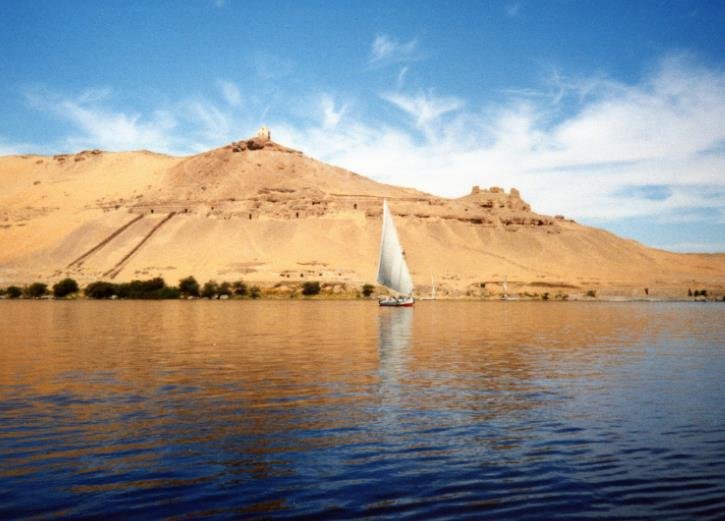Tensions continue to escalate in the Nile Basin as Egypt and Sudan staunchly defend their historical water rights against upstream nations seeking equitable utilization of the river’s resources. More than two decades after the inception of the Nile Basin Initiative (NBI), disputes over water allocation and management persist, highlighting the complex interplay between historical agreements and modern-day geopolitical dynamics.
Historical Context: Nile Basin Initiative and Cooperative Framework Agreement
The Nile Basin Initiative (NBI) was launched in 1999 with the aim of achieving sustainable socioeconomic development by ensuring fair use and shared benefits from the Nile River’s water resources. The initiative brought together nine countries sharing the Nile Basin, including downstream nations Egypt and Sudan, and upstream countries Ethiopia, Uganda, Kenya, Tanzania, Burundi, Rwanda, and the Democratic Republic of Congo (DRC), with Eritrea participating as an observer.
In May 2010, a subset of these countries—Ethiopia, Kenya, Uganda, Rwanda, and Tanzania—signed the Cooperative Framework Agreement (CFA). This agreement sought to replace the 1923 convention, which had historically allocated 55.5 billion cubic meters of Nile water annually to Egypt and 18.5 billion cubic meters to Sudan. The CFA proposed a more equitable distribution based on the principle of “equitable and reasonable” utilization. However, the agreement required the signature of six countries to come into effect, a threshold that Egypt and Sudan vehemently opposed.

Egypt and Sudan’s Stance: Upholding Historical Water Rights
Egypt and Sudan have consistently resisted the CFA, citing concerns that the agreement threatens their established water entitlements under the 1929 and 1959 Nile River agreements. These historical treaties granted Egypt approximately 75% of the Nile’s total flow and Sudan 25%, a distribution that Egypt argues is crucial for its national water security.
Former Egyptian Foreign Ministry spokesman, Hossam Zaki, affirmed Egypt’s position, stating, “Egypt will not join or sign any agreement that affects its share.” This stance underscores the deep-rooted reliance Egypt and Sudan have on the Nile’s waters for agriculture, industry, and domestic use.
Upstream Countries’ Perspective: Moving Beyond Colonial-Era Treaties
In contrast, upstream nations contend that colonial-era treaties are outdated and do not reflect the current realities of population growth, climate change, and economic development. They advocate for the “equitable and reasonable” use of Nile waters, arguing that all Nile Basin countries should have a fair share based on their contribution to the river’s flow and their water needs.
However, these nations have yet to provide specific frameworks for what constitutes “fair rights” or detailed allocation mechanisms, leading to ongoing disagreements and a lack of consensus within the NBI framework.
Recent Developments: South Sudan Joins the CFA
A significant development occurred in July 2024 when South Sudan, having gained independence in July 2011, ratified the CFA. This marked the sixth signature required to bring the agreement into force, allowing upstream countries to initiate water projects on the Nile without prior notification to downstream nations.
The ratification by South Sudan reignited tensions, as Egypt and Sudan continue to oppose the CFA’s implementation. They argue that the agreement undermines their historical rights and could lead to reduced water availability, jeopardizing their national water security.
Ongoing Negotiations: Cairo’s Efforts to Mediate
In an effort to navigate the escalating tensions, the Egyptian-Sudanese Permanent Joint Technical Commission for Nile Waters (PJTC) held a two-day meeting in Cairo on October 11 and 12, 2024. The discussions focused on addressing the current conundrum posed by the CFA’s implementation and seeking pathways to reconcile the divergent interests of upstream and downstream countries.
Timothy E. Kaldas, deputy director of the Washington-based Tahrir Institute for Middle East Policy, observed, “Cairo has successfully leveraged the Mideast crises that was set off by the Hamas attack on Israel on October 7, 2023, to advance its financial interests and geopolitical significance.”
International Legal Framework: The ICJ’s Stance
In alignment with a 1989 ruling from the International Court of Justice (ICJ), Egypt maintains that its water agreements with Sudan hold the same immutability as border agreements. This means they cannot be revoked or amended without the consent of all parties involved, reinforcing Egypt’s position against the CFA.
Impact on Regional Stability and Water Security
The ongoing disputes over Nile water rights have profound implications for regional stability and the economic well-being of Nile Basin countries. Egypt and Sudan argue that their water security is non-negotiable, as the Nile’s waters are essential for their populations’ survival and economic activities.
Conversely, upstream countries view the CFA as a necessary step towards modernizing water management and ensuring that all nations can sustainably develop their economies. The failure to reach an agreement threatens to perpetuate water scarcity issues, potentially leading to increased tensions and conflicts over water resources.
Future Outlook: Seeking Equitable Solutions
As the NBI marks over two decades of collaborative efforts, the quest for an equitable water-sharing agreement remains elusive. The ratification of the CFA by South Sudan adds complexity to the negotiations, necessitating renewed diplomatic efforts to bridge the gap between upstream aspirations and downstream assurances.
Christian Achrainer, a researcher at Denmark’s Roskilde University, noted, “Egypt’s new prominence in the Middle East and North Africa has silenced external comments on human rights violations, emboldening el-Sissi to continue imprisoning people.” While this statement primarily addresses internal human rights issues, it also highlights the broader geopolitical maneuvering that influences regional negotiations over the Nile’s waters.
Conclusion: Navigating a Complex Geopolitical Landscape
The enduring dispute over Nile water rights exemplifies the intricate balance between historical entitlements and contemporary needs. Egypt and Sudan remain steadfast in defending their historical water shares, while upstream nations push for a more equitable distribution framework through the CFA. As regional dynamics evolve, the pursuit of a sustainable and fair water-sharing agreement remains critical for the Nile Basin’s socioeconomic development and regional harmony.
